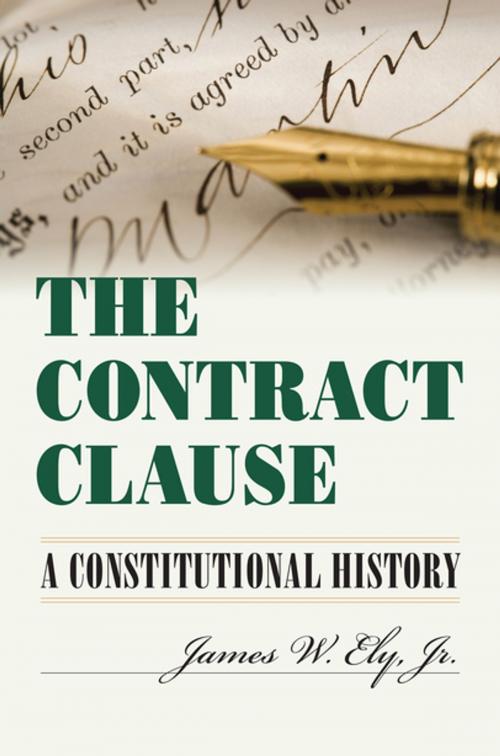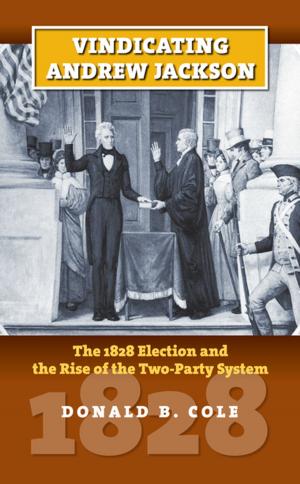The Contract Clause
A Constitutional History
Nonfiction, Social & Cultural Studies, Current Events, Political Science, Government, Local Government, Reference & Language, Law, Constitutional| Author: | James W. Jr. Ely | ISBN: | 9780700623082 |
| Publisher: | University Press of Kansas | Publication: | October 28, 2016 |
| Imprint: | University Press of Kansas | Language: | English |
| Author: | James W. Jr. Ely |
| ISBN: | 9780700623082 |
| Publisher: | University Press of Kansas |
| Publication: | October 28, 2016 |
| Imprint: | University Press of Kansas |
| Language: | English |
Few provisions of the American Constitution have had such a tumultuous history as the contract clause. Prompted by efforts in a number of states to interfere with debtor-creditor relationships after the Revolution, the clause—Article I, Section 10—reads that no state shall “pass any. . . Law impairing the Obligation of Contracts.” Honoring contractual commitments, in the framers’ view, would serve the public interest to encourage commerce and economic growth. How the contract clause has fared, as chronicled in this book by James W. Ely, Jr., tells us a great deal about the shifting concerns and assumptions of Americans. Its history provides a window on matters central to American constitutional history, including the protection of economic rights, the growth of judicial review, and the role of federalism.
Under the leadership of Chief Justice John Marshall, the Supreme Court construed the provision expansively, and it rapidly became the primary vehicle for federal judicial review of state legislation before the adoption of the Fourteenth Amendment. Indeed, the contract clause was one of the most litigated provisions of the Constitution throughout the nineteenth century, and its history reflects the impact of wars, economic distress, and political currents on reading the Constitution. Ely shows how, over time, the courts carved out several malleable exceptions to the constitutional protection of contracts—most notably the notion of an inalienable police power—thus weakening the contract clause and enhancing state regulatory authority. His study documents the near-fatal blow dealt to the provision by New Deal constitutionalism, when the perceived need for governmental intervention in the economy superseded the economic rights of individuals.
Though the 1970s saw a modest revival of interest in the contract clause, the criteria for invoking it remain uncertain. And yet, as state and local governments try to trim the benefits of public sector employees, the provision has once again figured prominently in litigation. In this book, James Ely gives us a timely, analytical lens for understanding these contemporary challenges, as well as the critical historical significance of the contract clause.
Few provisions of the American Constitution have had such a tumultuous history as the contract clause. Prompted by efforts in a number of states to interfere with debtor-creditor relationships after the Revolution, the clause—Article I, Section 10—reads that no state shall “pass any. . . Law impairing the Obligation of Contracts.” Honoring contractual commitments, in the framers’ view, would serve the public interest to encourage commerce and economic growth. How the contract clause has fared, as chronicled in this book by James W. Ely, Jr., tells us a great deal about the shifting concerns and assumptions of Americans. Its history provides a window on matters central to American constitutional history, including the protection of economic rights, the growth of judicial review, and the role of federalism.
Under the leadership of Chief Justice John Marshall, the Supreme Court construed the provision expansively, and it rapidly became the primary vehicle for federal judicial review of state legislation before the adoption of the Fourteenth Amendment. Indeed, the contract clause was one of the most litigated provisions of the Constitution throughout the nineteenth century, and its history reflects the impact of wars, economic distress, and political currents on reading the Constitution. Ely shows how, over time, the courts carved out several malleable exceptions to the constitutional protection of contracts—most notably the notion of an inalienable police power—thus weakening the contract clause and enhancing state regulatory authority. His study documents the near-fatal blow dealt to the provision by New Deal constitutionalism, when the perceived need for governmental intervention in the economy superseded the economic rights of individuals.
Though the 1970s saw a modest revival of interest in the contract clause, the criteria for invoking it remain uncertain. And yet, as state and local governments try to trim the benefits of public sector employees, the provision has once again figured prominently in litigation. In this book, James Ely gives us a timely, analytical lens for understanding these contemporary challenges, as well as the critical historical significance of the contract clause.















